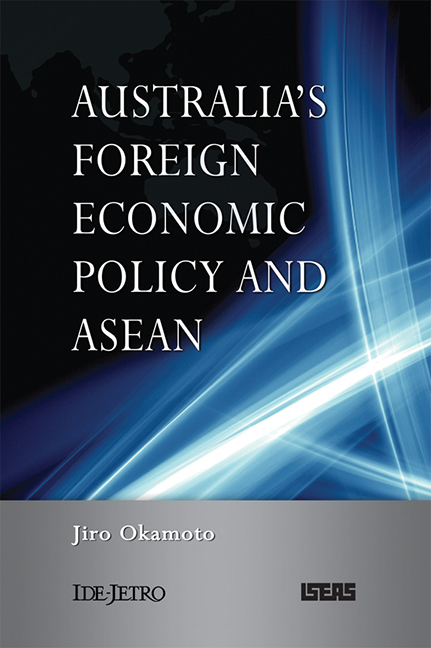Book contents
- Frontmatter
- Contents
- List of Figures and Tables
- Abbreviations and Acronyms
- Acknowledgements
- 1 Introduction
- 2 An Analytical Framework
- 3 State-Society Coalitions and Australia's Foreign Economic Policy
- 4 Australia and the Formation of ASEAN
- 5 The Trade Liberalizers and Asia-Pacific Regionalist Strategies
- 6 The Development of ASEAN Regionalism and the AFTA–CER Linkage Dialogue
- 7 The Bilateralists and their ASEAN Policy
- 8 Conclusion
- Appendix: Foreign Economic Policy-Related Ministers in Australia since 1941
- References
- Index
- About the Author
- Frontmatter
- Contents
- List of Figures and Tables
- Abbreviations and Acronyms
- Acknowledgements
- 1 Introduction
- 2 An Analytical Framework
- 3 State-Society Coalitions and Australia's Foreign Economic Policy
- 4 Australia and the Formation of ASEAN
- 5 The Trade Liberalizers and Asia-Pacific Regionalist Strategies
- 6 The Development of ASEAN Regionalism and the AFTA–CER Linkage Dialogue
- 7 The Bilateralists and their ASEAN Policy
- 8 Conclusion
- Appendix: Foreign Economic Policy-Related Ministers in Australia since 1941
- References
- Index
- About the Author
Summary
Australia's foreign economic policy towards ASEAN has changed considerably over the past thirty to forty years. The change has not only closely reflected the shifts in Australia's overall foreign economic policy orientation but at times it also strongly drove those shifts. This chapter reviews the findings and insights of previous chapters. The implications for Australia's foreign economic policy in the future are also raised. The chapter concludes with a remark that the bilateralist approach as the dominant strategy for Australia's foreign economic policy is likely to continue for some time.
THE RISE AND FALL OF STATE-SOCIETY COALITIONS AND CHANGES IN Australia's ASEAN POLICY
To explain the changes in Australia's foreign economic policy towards ASEAN, the book focused on the evolution of state-society relations. By positing virtual coalitions among state and society actors with shared beliefs on policy ideas (perceptions of causal relationships between policy goals and the most effective policies for realizing those goals) as the core competitors in the policy process, this book' approach facilitates a layered analysis of factors affecting Australia's foreign economic policy and its ASEAN policy decisions.
Changes in the International Environment and Shifts in Australia's Foreign Economic Policy
An analysis of the foreign economic policy of a smaller state like Australia needs to begin by defining the international structure, or environment, within which the state has to operate. The core policy ideas of state-society coalitions are difficult to change. Yet changes in the international environment may induce replacement of a dominant coalition with another coalition, because such changes in the international environment can act as exogenous shocks that shake the perception of the validity of the dominant coalition' policy ideas.
The protectionists’ domination began to erode in the 1970s when the international economic structure changed drastically after the first oil crisis. The beginning of globalization of national economies was associated with a slide in Australia's terms of trade from the mid-1970s well into the 1980s. During this period, there was continued questioning of the effectiveness of Australia's traditional economic policy strategy, which was characterized by “protection all round” and the institutionalized wage arbitration system that led to inflationary pressure and low productivity growth (thus, lower competitiveness) particularly in manufacturing.
- Type
- Chapter
- Information
- Australia's Foreign Economic Policy and ASEAN , pp. 247 - 265Publisher: ISEAS–Yusof Ishak InstitutePrint publication year: 2010

